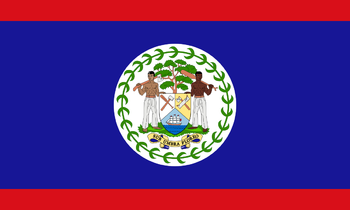Main Character Index Superpowers: Großgermanisches Reich (Heydrich's Germany) | The United States of America (1964-1968 American Presidents | 1972 American Presidents) | Dai-Nippon Teikoku Major Powers: Regno d'Italia | Iberian Union | Republic of Turkey | Ordensstaat Burgund Other Countries By Region: Africa: Northern & East Africa | West Africa | Southern Africa | Post-Colonial Central Africa Asia: Mainland China & Oceania (State of Guangdong | 1964-1972 Guangdong Chief Executives | Guangdong Flavor Characters) | Southeast Asia (Republic of Indonesia) | South Asia | Middle East | Central Asia Europe: Northern & Western Europe (British Isles | French State) | Southern Europe | Eastern Europe (Reichskommissariat Ukraine | Reichskommissariat Moskowien) Americas: North America | South America (United States of Brazil | Argentine Republic | Oriental Republic of Uruguay) The Russian Anarchy: West Russia (West Russian Revolutionary Front | Komi Republic | Communist Party of Komi | Passionariyy Organization | Taboritsky's Russia) | Southern Urals | Western Siberia | Central Siberia (Siberian Black Army) | The Far East (Harbin Three) | After Midnight Miscellaneous: Antarctica | Miscellaneous Content | Non-Canon Content
open/close all folders
Continental North America
Canada

Maple Leaf Flag
Pearson Pennant Flag
Official Name: Dominion of CanadaFr
Ruling Party: Liberal Party of Canadanote
Ideology: Liberalism
The Dominion of Canada became increasingly reliant on the United States of America after the United Kingdom capitulated to Germany. By 1962, the nation is a liberal democracy and an OFN member state.
- The Alliance: Canada is a founding member of the American led Organization of Free Nations, aligning itself with the United States after Britain fell.
- Allohistorical Allusion:
- Despite different circumstances, Canada will still go through the Great Canadian Flag Debate
 .
. - Subverted. The 1964 winter Olympics are still scheduled to take place in Innsbruck, Austria, in this timeline, but with the outbreak of the German civil war, the games are moved to Calgary in just three months.
- Despite different circumstances, Canada will still go through the Great Canadian Flag Debate
- Arch-Enemy: Given that Canada houses Elizabeth II and the original British government that fled the Isles after the Nazi invasion, it was inevitable that they would not recognize the German collaborationist government that overthrew them.
- The Bad Guy Wins: From the perspective of the First Nations; The Canadian Government's systematic colonial extermination of its Indigenous inhabitants unrestricted has by most accounts, already been achieved, with most information that comes out about its abuses being swept under the rug, and ignored by Government leadership, nor does any average Canadian actually care about the fate of the first nations. While there can be a few tenuous, tokenist reforms made to ever so slightly reduce the Governments gross mistreatment committed against the natives, no leadership path actually puts a stop to the government's genocidal policy against the indigenous in any meaningful way, much less ensure complete self-determination and national-independence of their nations from colonial control.
- Evil Colonialist: The Canadian Administration both in OTL and the TNO universe in relation to it's treatment of First-Nations people can be considered to be this, due to its policy of using various means to exterminate indigenous identity, culture, traditions, and society, such could be seen with its use of the residential schooling system, which served to effectively "assimilate", and "re-educate" native children, and kill off their former way of life.
- The Exile: A number of British political figures and ideologues found exile in Canada following World War 2. However, they can be restored to power if HMMLR wins the British Civil War and Knight reaches a deal with Jones and the Left Resistance.
- The Fundamentalist: Ignoring the obvious elephant in the room, The Social Credit Party base consists of many of these types, including Alberta Premier Ernest Manning, a Christian evangelical who believes that Canada can only survive if it bends to his religion and stays out of the supposedly inevitable and satanic war between Japan and the United States.
- Gameplay and Story Segregation: In-universe, the Canadian Head of State is the Governor General, the federal representative of Queen Elizabeth II. However, the position is held by the Prime Minister (who would technically be the Head of Government instead) in the GUI to better reflect their greater role in the story.
- Government in Exile: Canada is home to Queen Elizabeth II and the British government in exile, and the dominion is still holding onto the Falklands, South Georgia and the South Sandwich Islands, the Bahamas, Bermuda, Turks and Caicos, Saint Helena, Ascension, and Tristan da Cunha in stead of a legitimate British government.
- I Am Who?: Owing to its historical ties, Canada formally shares a constitution with Britain, but since Canada no longer recognizes the Nazi-collaborator government, they have been stuck with the issue of creating a new one for themselves. As such, this has left many Canadian citizens wondering what their national identity is.
- Meaningful Rename: Subverted. The Co-operative Commonwealth Federation never changed their name like in real-life, which subtly highlights some important divergences in this timeline. In OTL, the Co-operative Commonwealth Federation rebranded itself as the New Democratic Party and adopted a more moderate political platform
 . This was due to the CCF wanting to distance itself from its more radical founding as a socialist party. In TNO, there’s less of an urge to distance from socialism, so the party is still the Co-operative Commonwealth Federation in 1962.
. This was due to the CCF wanting to distance itself from its more radical founding as a socialist party. In TNO, there’s less of an urge to distance from socialism, so the party is still the Co-operative Commonwealth Federation in 1962. - Puppet State: Downplayed. Canada is independent from the United States, but their trading relationship is so close, that if something happens to the American economy, it will also affect the Canadian economy. Case in point, Nixon's decision to take the dollar off of silver has hit Canada hard, especially in its Western provinces.
- The Remnant: Under Queen Elizabeth II, Canada's the de facto heart of the "legitimate" Commonwealth, in contrast to the Nazi-collaborationist United Kingdom.
- Richard Nixon, the Used Car Salesman: OTL Prime Minister of Canada Pierre Trudeau is a small-time politician in Quebec, never becoming a major political force due to different circumstances. Trudeau didn’t moderate his political beliefs until traveling the world, mainly in Paris, which he wouldn’t be able to do with the continent under fascist domination.
- Teeth-Clenched Teamwork: Politically, Canada can be split into a rivalry between the wealthier Eastern provinces and the more downtrodden Western provinces, the former of which was often favored by Canadian politicians, much to the detriment of the latter. The rivalry has grown so bitter that the Western territories have begun considering more pragmatic solutions to alleviate their economic woes, even if it harms the country as a whole.
- Western Terrorists: Québécois terrorist groups, from the Marxist Front de libération du Québec to the Fascist Front de l'Unité Nationale du Québec, have long been a thorn in the side of the Canadian government.
- Would Be Rude to Say "Genocide": Nearly all information about the government's active participation in genocide against its first nation population is usually swept under the rug, or otherwise ignored by its leadership and the wider populace.
- Would Hurt a Child: All potential Canadian national leaders have no moral scruples with the government's utilization of residential schools against indigenous children. Something which OTL led to countless forms of neglect and abuse against indigenous children, even directly leading to many of those children dying, something which the true scale of is still only recently being brought to light.
- You Are in Command Now: With the British Isles taken over by Germany, the remnants of the British Empire were transferred to Canada. Stuck in an imperial limbo, Canada isn't sure what to do with its island vassals besides maintain their garrisons.
Lester B. Pearson
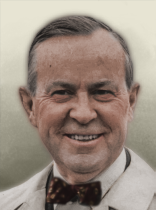
Role: Prime Minister
Party: Liberal Party of Canadanote
Ideology: Liberalism
In-Game Biography Click to Show
Pearson is a career politician, having served as High Commissioner of Canada for the United Kingdom until Operation Sealion. Following his return, Pearson entered federal politics, first as an MP and later as leader of the Liberal Party of Canada. He called for closer ties to the United States, and for strengthening the OFN against its rivals. His rhetoric was a success, and he led the Liberals to a massive victory against the Progressive Conservatives, ending their decade-long government.- The Ace: Pearson is well-known for being one of the most skilled diplomats of his time, having strengthened Canada's ties to the OFN and organizing nonpartisan efforts to boost Canada's reputation to non-aligned nations.
- Affectionate Nickname: Pearson is known by his nickname "Mike"note .
- Internal Reformist: If re-elected Pearson will make promises of a new constitution, universal healthcare, economic reform, and addressing the issues of disaffected Quebecois and western Canadians.
- Landslide Election: In the 1958 elections, Pearson led the Liberals to power after a landslide victory against the Conservatives.
John Diefenbaker

Role: Prime Minister (1963 election)
Party: Progressive-Conservative Party of Canadanote
Ideology: Prairie Populismnote
In-Game Biography Click to Show
Diefenbaker is no stranger to conflict, having served with distinction during the First World War. He is a career politician, having been in the house the longest out of Pearson and Douglas. However, his time in politics has worn him out, and his defeat to the Liberals have tarnished his reputation within the Tories. His goals, should he be reelected, is to lessen the dependance Canada has on the United States.- The Cassandra: Diefenbaker strongly opposed free trade because it would cede Canadian independence to the American sphere of influence. However, few listened to him because the Progressive Conservatives had lost most of their influence to the Liberal Party, but his fears did come true, as the United States practically dictates Canada's foreign and domestic policies.
- Dry Crusader: Under Diefenbaker's leadership, members of the Progressive Conservatives are prohibited from drinking alcohol or smoking cigars during meetings. If Stanfield becomes the party's leader, many members are pleased they can now enjoy those luxuries.
- Good Old Ways: Diefenbaker prefers to live an old-fashioned life, such as taking whistle-stop tours during his political campaigns.
- Internal Reformist: Diefenbaker promises a new constitution, economic development in the Far North, and bridging the divide between Quebec and the West.
- Resigned in Disgrace: Diefenbaker can be forced to resign by a coalition of disgruntled Progressive Conservative members, with Robert Stanfield becoming the party's new leader.
John Turner

Role: Prime Minister (1967 election)
Party: Liberal Party of Canadanote
Ideology: Classical Liberalismnote
- But Not Too Foreign: Turner was Born in Richmond, Surrey in England, and moved to British Columbia with his Canadian mother in 1932 after his father died.
- Historical Badass Upgrade: In our timeline Turner was only Prime Minister for a few months before being defeated by Brian Mulroney's Progressive Conservatives in a landslide victory.
- New Era Speech: In preparation for his 1967 campaign, Turner sermonizes to an audience of young Liberals about how he'll lead Canada into a new age without poverty and unemployment.
- Taking Up the Mantle: Turner vows to continue and expand upon the progress made by the Pearson government.
- Young and in Charge: At only 37 years of age, Turner is set to be the youngest Prime Minister in Canada's history.
- Young Future Famous People: Turner became Prime Minister of Canada in our timeline but not until 1984.
Robert Stanfield
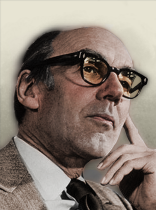
Role: Prime Minister (1967 election)
Party: Progressive-Conservative Party of Canadanote
Ideology: Big Tentnote
- Suspiciously Similar Substitute: Stanfield will become the leader of the Progressive Conservatives if Diefenbaker is forcefully resigned from the position, with many Progressive Conservatives hoping that he'll realign the party to a "true blue conservative vision".
Tommy Douglas
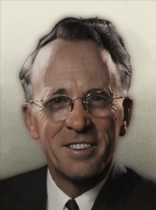
Role: Prime Minister (1967 election)
Party: Co-operative Commonwealth Federationnote
Ideology: Democratic Socialismnote
In-Game Biography Click to Show
Initially studying to become a Baptist minister, Douglas instead entered politics in when elected to the House of Commons in 1935. He quickly rose in the ranks of the party, becoming premier of Saskatchewan, and later leader of the Co-operative Commonwealth Federation (CCF). His progressive stances, particularly his support for universal healthcare, has seen him rise in prominence in Canada, his popularity with the people making him a formidable rival to the Liberals and Tories.- The Ace: Douglas is extremely charismatic, quickly becoming one of the most popular politicians in Canada and turning the once-small CCF into a viable opponent to the Liberal establishment
- The Atoner: Having witnessed the Nazi Eugenics program during a visit to the Reich in 1936, Douglas has abandoned his previous support of the practice, and is haunted by his previous advocacy of it.
- But Not Too Foreign: Douglas was born in Scotland in 1904 and moved to Canada with his family in 1910, settling in Winnipeg.
- Dark Secret: In 1930, Douglas obtained his master's degree by writing a thesis which endorsed eugenics. note Nevertheless, he managed to become a beloved figure in Canadian politics, but must still strive to at least partially keep his eccentric past, particularly this thesis, under wraps.
- Good Shepherd: When studying theology in the Baptist Brandon College, Douglas subscribed to the Social Gospel Movement, which taught that Christianity was as concerned with social justice as it was with salvation. This led him to pursue a political career and advocate for numerous social programs, particularly universal health care.
- Preacher Man: Douglas was initially studying to become a Baptist minister. He instead entered politics and has used the skills he learned in college in his speeches and when speaking in parliament.
- Understatement: His biography mentions that he wrote an "interesting" thesis paper during his college education, which is a rather indirect way of saying that he wrote an essay endorsing eugenics.
Réal Caouette

Role: Prime Minister (1967 election)
Party: Social Credit Party of Canadanote
Ideology: Social Creditnote
In-Game Biography Click to Show
- The Alliance: Were it not for the Social Credit party winning a majority of seats, the Liberals, Conservatives, and even the CCF would’ve worked together to keep them out of power.
- Dark Horse Victory: To the shock of many Canadians, the Social Credit party can not only just win the most seats, but also a commanding majority of seats in the house of commons.
- Even Evil Has Loved Ones: In his teased election event, Réal loves and praises his son Gilles for his political successes and the feeling is mutual.
- Politically Incorrect Villain: Caouette is known for his anti-semitism and inflammatory statements. He has openly praised the economic policies of Mussolini and Hitler and has called them his political heroes.
- Teeth-Clenched Teamwork: The Social Credit Party is divided between the Québécois and Albertan wings of the party. The Québécois wing strongly believes in C.H. Douglas’s economic theories and is more antisemitic. The Albertan branch of the party is more pragmatic in their politics, caring less about the specifics of Douglas’s economic ideas, and is more religious than their Québécois counterparts. If elected, Caouette will have to whip the Albertan Socreds into supporting his policies, and rivals such as Pearson can exploit these divisions for political gain.
- Windmill Crusader: Caouette thinks that all of his country's problems can be pinned on a Zionist and Masonic conspiracy to line their pockets with stolen money from the average Canadian. It's an odd and anti-semitic theory, but many believe in his convictions and support his crusade to fight against them by targeting the Bank of Canada, a supposedly major front for this conspiracy.
United Mexican States

Official Name: United Mexican States
Ruling Party: Partido Revolucionario Institucionalnote
Ideology: Institutional Despotismnote
- Always Second Best: Behind the PRI, the second most powerful political party in Mexico is the Party of of National Action (PAN). They have an appeal to the middle class, but they have not supplanted the PRI in decades, since the political system is structured to advantage the latter. The PAN regularly condemns the anti-democratic and corrupt measures of the PRI, but so far, they have failed to loosen their grip on the country.
- Banana Republic: Mexico's official name would imply it's The Federation, but it's truthfully a one-party state dominated by the PRI. Any other legal candidate running in an election is a dummy set up by the PRI to keep up the illusion of being democratic.
- Crapsaccharine World: From an technical standpoint, Mexico is a flourishing country that has enjoyed an unparalleled economic growth from its population boom, increasing middle class, and improvements in quality of life. Despite its prosperity, Mexico is not the democratic country that it claims to be, as the Partido Revolucionario Institucional effectively runs it like a corrupt one-party state and must keep the illusion of freedom to stay in power. However, cracks in the image begin to reveal themselves after the Yasuda Crisis in Japan fires and incites minor economic and political upheaval in Mexico by forcing layoffs and bankruptcies, which is nicknamed the Kabuki Effect. Upon this, the citizens finally rise up in protest and each potential successor for the PRI have to manage a balancing act of appeasing the workers, peasantry, Federal Security Directorate, intelligentsia, industrialists, and party officials to win the presidency.
- Corrupt Politician: One of the biggest problems facing Mexico is corruption, as federal land lords often abuse the ejido system of collective agriculture and sacrifice the bureacracy's efficiency in favor of earning promotions for themselves. For their part, the citizens are growing tired of this corruption and calls for reform have been rising.
- Hollywood Atheist: The PRI enforces a policy of strict atheism, a fact that is decried by the Christian Humanists in the PAN party.
- A House Divided: While the PRI is the dominant party in Mexico, they are having problems maintaining a consensus concerning certain issues, such as foreign policy, ever since new factions started appearing. This has made the government slower and more ineffective.
- Regime Change: Mexico is one of the Caribbean Legion's backers in the Puerto Plata invasion and attempt to overthrow Trujillo in the Dominican Republic.
- Succession Crisis: As President López Mateos' term comes to an end, many backroom deals are being made as the three potential successors jockey for influence, while foreign actors also put their thumb on the scales for their preferred candidates.
- Team Switzerland: Under President López Mateos, Mexico has continued following the Estrada Doctrine of non-interference in foreign nations and diplomatic neutrality on the basis of upholding self-determination globally. As such, a policy of strict neutrality between the United States of America and the Empire of Japan is followed and, depending on who succeeds him, Mexico might continue its geopolitical neutrality, move closer towards the OFN, or drift towards the Sphere.
Adolfo López Mateos

Role: President of Mexiconote
Party: Partido Revolucionario Institucionalnote
Ideology: Institutional Despotismnote
In-Game Biography Click to Show
- Choosing Neutrality: López Mateos thinks that Mexico is above war and foreign intervention, refusing to align with either the United States or Japan.
- Internal Reformist: López Mateos' presidency was marked by various changes such as land reform, expansions of education and healthcare, and the nationalization of the electrical industry. Whether or not he will be able to achieve these reforms in the face of institutionalized opposition is another question and an uphill battle Madrazo will have to face.
- Multiple-Choice Past: His past is shrouded in mystery, with López Mateos either being born in Mexico City or a bastard from Guatemala who masquerades as a Mexican to further his political career. Obviously, the latter story is popular among his critics.
- We Hardly Knew Ye: With the upcoming 1964 election, López Mateos' term is almost up and ready to pass on the presidency to another PRI politician.
Tropes pertaining to upcoming content
- Black Comedy: When his wife questions his dependence on painkillers during the teased doctor strikes, López Mateos quips "I can't very well see a doctor about it now, can I?"
- Choosing Neutrality: In "The Great Human President" teaser, the most he'll do for either the United States or Japan is make a speech affirming Mexico's neutrality and slightly mend relations between both sides.
- Functional Addict: While the President of Mexico, López Mateos is highly dependent on painkillers for headaches, as seen in the Doctor Strike teaser.
- Pet the Dog: In "The Great Human President" teaser, López Mateos feels pride in his effort to modernize the education system, particularly with the National Commission of Free Textbooks. He goes out of his way to visit a newly renovated school in Guanajuato, traversing the steep streets before taking a tour. Seeing kids with new textbooks on the Mexican Revolution pleases him, as he grew up with a much worse education in Mexico City.
- Villain with Good Publicity: Despite presiding over a dictatorial, dominant-party state, López Mateos is widely praised for his role in modernizing Mexico. "The Great Human President" teaser shows that he is most praised for modernizing the education system, an example of which was the opening of the Instituto Tecnológico de Morelia in Michoacán where the governor thanks López Mateos for offering the next generation a chance to fulfil their dreams to a jubilant crowd of thousands of students.
Raúl Salinas Lozano

Role: Economy Minister (López Mateos cabinet), President of Mexiconote (1964 election)
Party: Partido Revolucionario Institucionalnote
Ideology: Institutional Despotismnote
In-Game Biography Click to Show
- The Ace: When it comes to economics, Lozano has had an impressively long and successful career. To list his most famous accomplishments, he founded the National Institute of Public Administration, headed Economic Studies in the Ministry of Finance, and rose to become López Mateos' economic minister.
- Enemy Mine: Lozano wants to cooperate with Japan to displace the American influence in the Mexican economy. This puts Lozano into conflicts with those who either want to remain closer to the OFN or, at least, remain on cordiale terms.
- Internal Reformist: Lozano is a major advocate of economic reforms to drive Mexico towards being more technocratic, inspired by the economies of the CPS, and with a massive drive against corruption within the PRI in order to save the revolution.
Tropes pertaining to upcoming content
- The Ace: The "El Tapado" teaser elaborates on how skilled Lozano is. As economic minister, he fostered greater connections with Japan's political and business establishment, bringing Japanese firms into Mexico and encouraging Mexican companies to export to the CPS. This lowered Mexico's trade deficit, supported continued economic growth, and reduced their dependence on the United States. As a bonus, these policies funded López Mateos' education and welfare, making Lozano a likely successor.
- Realpolitik: Unlike López Mateos in the "El Tapado" teaser, Lozano is more willing to open up fishing waters to the Japanese. Even though it represents a threat to the people living in the coastline and could incite outrage from America, Lozano argues that the cooperation can be key to providing higher and more stable incomes to the Pacific territories, facilitating their industrial projects. Still, López Mateos is unconvinced and may only consider the proposal when Lozano offers to implement a quota and movement restrictions.
- Rousing Speech: Subverted. In "The Great Human" teaser, Lozano attempts to rally the audience at his inauguration with a pledge to reform the economy, speed up industrialization, and crack down on corruption to build a modern Mexico, proclaiming it to be the uncomfortable new course worth taking. Unfortunately for Lozano, the crowd is unreceptive and the PRI officials look on worriedly about his anti-corruption pledges.
Gustavo Díaz Ordaz

Role: Head of Government (López Mateos cabinet), President of Mexiconote (1964 election)
Party: Partido Revolucionario Institucionalnote
Ideology: Institutional Despotismnote
In-Game Biography Click to Show
- Dragon Ascendant: Ordaz is López Mateos' Secretary of the Interior, the Head of Government, and is one of the three possible successors to López Mateos.
- Good Old Ways: Ordaz is a man who still holds to the status quo and is unwilling to enact reforms to change that, no matter how many people protest.
- Odd Friendship: Díaz Ordaz and López Mateos are very close friends despite being polar opposites.
- Rags to Riches: Born into poverty and rejected by his own mother for his ugly appearance, Ordaz rose from his unprivileged beginnings to become an esteemed politician and potentially its President.
- Well-Intentioned Extremist: He dreams of a strong and prosperous Mexico, and if it means resorting to violence to suppress civilian protests, then so be it.
Tropes pertaining to upcoming content
- Appeal to Tradition: During Ordaz's inauguration speech in "The Great Human President" teaser, he pledges to uphold the constitution and continue the status quo, which he deems better for the Mexican people than the suppossed radicalness and lawlessness he's fighting against.
- Beneath the Mask: In "The Great Human President" teaser, Ordaz doubts and worries about his plans for Mexico and these concerns arise when the crowd gathered at his inauguration are unenthused by his speech, proclaiming to continue the status quo. He buries these thoughts and thinks that they can doubt him if they want, vowing to prove himself worthy.
- Old Friend: As mentioned in the "El Tapado" teaser, Ordaz has been a long-time friend of López Mateos from early in their political careers. Ordaz served as López Mateos' Secretary of the Interior and is considered a potential successor, despite their friendship recently taking a dive.
- Pragmatic Villainy: In "The Great Human President" teaser, Ordaz plans to implement moderate economic and social reforms to placate the left of the party.
- The Reliable One: According to his teased biography, Ordaz became indispensable to López Mateos' cabinet due to him handling much of the work on hand. While working his way up the PRI and Interior Ministry, he rose in importance due to stopping the Interior Ministries political infighting during the reign of Ruiz Cortines.
- We Used to Be Friends: Downplayed in the "El Tapado". López Mateos still considers him a friend, but Ordaz has fallen out of favor to succeed him when he expressed an aggressively pro-OFN sentiment during the Hawaiian Missile Crisis.
- Zero-Approval Gambit: Zig-Zagged. From his teased biography, his strict law enforcement policies, pro-OFN policies, and moderate economic and social reforms make him appealing to the PRI. However, the people just see him as a neoimperialist dictator, though Ordaz doesn't care and is willing to take that risk if he can prove himself better than López Mateos.
Carlos Alberto Madrazo

Role: President of Mexiconote (1964 election)
Party: Partido Revolucionario Institucionalnote
Ideology: Institutional Despotismnote
In-Game Biography Click to Show
- The Friend Nobody Likes: Due to speaking out against the corruption of the PRI, Madrazo is disliked by his own party, who form a coalition with disgruntled businessmen to halt his reforms.
- Internal Reformist: Madrazo is a firm reformist, with a commitment to anti-corruption and tackling the socio-economic problems in the nation.
- Red Baron: Madrazo is nicknamed the "Cyclone from the Southeast", representing the change he will bring to Mexico.
- Self-Made Man: Madrazo grew up in poverty and a long history of activism, with his oratory skills propelling him into politics, becoming governor of Tabasco and transforming the local industry and infrastructure. He can potentially reach the heights of becoming president of Mexico, if he wins the succession battle after López Mateos.
- Team Switzerland: Madrazo is committed to neutrality, pursuing protectionist agendas against both the USA and Japan.
Tropes pertaining to upcoming content
- The Determinator: Madrazo has spent his life working through politics to implement reforms that would benefit the common person and is determined to continue anti-corruption efforts and socio-economic reforms. In his election event from "The Great Human President" teaser, he promises fundamental reforms in his inauguration speech, even if he will face opposition from the orthodox members of the PRI.
- Villain with Good Publicity: Madrazo is reputed as a skilled orator, capturing the praise of the youth and workers. His inauguration speech in "The Great Human President" teaser is the only one to be well received by the crowd watching, who cheer on his pledges to tackle Mexico's socio-economic issues.
"Crossroads of Liberty"
Upcoming content coming with Mexico in the "Crossroads of Liberty" update.- Attack Backfire: When bonuses are halted and outrage sweeps through the Hospital 20 de Noviembre in the Doctor Strike teaser, 210 doctors and interns send a letter to the director, proclaiming a strike of all fields except emergency medicine and demanding better treatment in accordance with the tenets of the Institutional Revolution. When the director nervously presents the letter to the hospital board, all 210 are immediately fired. However, this only turns them into martyrs and prompts 206 other doctors and interns to form a union called AMMRI. After they too are fired, doctors across the country follow suit with mass walkouts and the public learning of the horrible working conditions in hospitals.
- Confessional: In the Puerto Plata expansion teaser, Salvador Estrella Sadhalá expresses doubts about his worthiness speaking to Monsignor Zanini, where he asks for forgiveness in his plan to assassinate Trujillo. This comes off the back of confessions of minor sins to Father Fortín, before confiding in his plan which prompted Fortín to send Salvador to meet Zanini.
- Defiant to the End: In "The Great Human President" teaser, the Jaramillos don't show any fear before they are murdered in cold-blood. Kidnapped by a unit of the Federal Judicial Police in the city of Tialquitenango, the Jaramillo family are blindfolded and driven out to the Xochicalco ruins for execution. Knowing that their fate is sealed, they attempt to lunge at the guards, so they are beaten unconscious and subsequently shot.
- Good Shepherd: Monsignor Zanini is the Pope's representative in the Dominican Republic, as the nuncio in charge of the nunciature. In the Puerto Plata expansion teaser, he lets Salvador Estrella Sahalá confide in his plans to assassinate Trujillo and attempts to ease the moral burden of such a plan.
- Inciting Incident: Working conditions in the Hospital 20 de Noviembre and other Mexican medical facilities are very poor, as shown in the Doctor Strike teaser. Supplies frequently go missing due to scavenging and scrapping, replacement materials taking weeks to arrive, cleanliness is non-existent, and rest or vacations are virtually unheard of. So, when the hospital director delivers news from the Ministry of Health that staff will not be receiving their regular pay bonuses, the outrage spirals into nationwide doctor strikes.
- Inspirational Martyr: Just like in OTL, Zapatista opposition figure Rubén Jaramillo and most of his family were kidnapped and murdered in the Xochicalco ruins, deemed a loose end by López Mateos for his support of Zapatismo and refusal to stay silent since he was given amnesty in 1958. However, his surviving daughter shared what had happened, sparking outrage from all of Mexico's opposition groups and turning his name into a rallying cry for the working class in "The Great Human President" teaser.
- Let No Crisis Go to Waste: While the country is dragged into economic and political upheaval in the Kabuki Effect from "The Great Human President" teaser, López Mateos' successors use the situation to get ahead and secure a nomination for the presidency.
- Meet the New Boss: Subverted in the "El Tapado" teaser. Much as López Mateos would like to find a successor with the same beliefs as him, the PRI's left-wing has been destroyed and rendered it impossible to do so.
- Shouting Free-for-All: When the Cardenistas of the PRI organize a conference in Michoacán, Cárdenas himself doesn't show up and instead attends a rally in the "El Tapado" teaser. The mass confusion at the conference soon descends into chaotic shouting. Madrazo tries to rein them in and rhetorically ask if this is what Cárdenas would want, but this fails and Madrazo storms out asking himself the same question.
- Snooty Haute Cuisine: Subverted in the "El Tapado teaser. When López Mateos meets Corpus Christi to make a petroleum deal, he's surprised to see that the meeting catered Whataburger, but López Mateos doesn't mind. If anything, he wolfs the burger and fries down.
- Succession Crisis: As President López Mateos' term comes to an end in the "El Tapado" teaser, many backroom deals are made as the three potential successors jockey for influence within the PRI, backed by foreign actors putting their thumb on the scales for their preferred candidate. In the 40's and early 50's, the successor used to be chosen by genuine intra-party discussions, but the recent schisms means that the successor is now solely chosen by the current President. The speculation of who could be the successor is represented with a political caricature titled "El Tapado", a hooded illusive figure. In-game, the decision-making behind to identify the figure is represented through the president's notebook, where traits are written down as foreign diplomacy and the national focus tree progresses. At the end, whichever candidate has the greatest opinion will secure the position.
- Took a Level in Cynic: A teased event from "The Great Human President" teaser takes place from a factory worker, who already feels jaded by the existing status-quo, toiling away on a production line and suspecting that a doctor strike was orchestrated by shadowy power players. News of Ordaz's nomination to the presidency and confirmation through a sham election further his cynicism, seeing little hope in the future of Mexico with a corrupt dictator in power. This culminates in a Screw This, I'm Outta Here moment as he realizes that there is no future in Mexico for the rural and urban populations and vows to immigrate to America.
- Torture Always Works: In "The Great Human President" teaser, multiple armed and masked men kidnap a man and bring him into the woods, demanding he tell them who he works for. While the man is defiant in response to the beatings, he immediately backs down once he is threatened with a hammer, informing them he is paid by local landowners and others. The masked men accept this but still break his knees, claiming that they only promised they "might" let him live.
- Training Montage: In the Puerto Plata expansion teaser, the conspirators plotting to assassinate Trujillo engage in an extensive training program. Armed to the teeth, they time repeated drives around a parking lot in a modified Chevrolet Biscayne, with the hopes of getting faster and more accurate with their shooting.
Greenland

Official Name: Greenland
Ruling Party: Siumutnote
Ideology: Democratic Socialismnote
A former Danish Realm territory. Occupied by the United States during WWII, it entered the Cold War as a de facto US territory. Changing geopolitical circumstances in the North Atlantic can lead to the US granting Greenland its independence.
- Beyond the Impossible: The idea of an independent Greenland was virtually unthinkable a decade ago, yet it somehow comes to reality, if Iceland turns against the OFN.
- Nature Is Not Nice: Being so near the North Pole, harsh winters are a part of daily life in Greenland, reducing their living standards and only mitigated by foreign funds.
- Puppet State: Though independent, Greenland is still flooded with OFN funds and personnel, who are desperate to maintain control of the Thule Base and the North Atlantic.
Jonathan Motzfeldt

Role: Head of State
Party: Siumutnote
Ideology: Democratic Socialismnote
In-Game Biography Click to Show
- Founder of the Kingdom: He is widely acknowledged as the Father of Greenland, having advocated its independence a decade before it was officially attained.
Central America
Guatemala
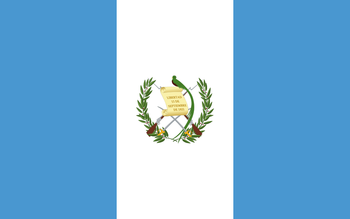
Official Name: Republic of Guatemala
Ruling Party: Unión de la Revolución Guatemalteca (Partido de la Revolución Guatemalteca)note
Ideology: Social Democracynote
- Arch-Enemy: Guatemala is British Honduras' top rival in Central America, constantly aggravating and threatening to invade them.
Luis Cardoza y Aragón

Role: Head of State
Party: Unión de la Revolución Guatemalteca (Partido de la Revolución Guatemalteca)note
Ideology: Social Democracynote
- We Hardly Knew Ye: Luis Cardoza y Aragón will only stay in power for a very short while before he is couped by Fuentes and the National Front.
Miguel Ydígoras Fuentes
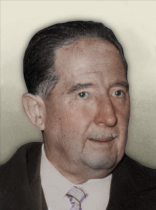
Role: Head of State (1962 coup)
Party: Frente Nacional (Partido Reconciliacion Democratica Nacional)note
Ideology: National Conservatismnote
- The Coup: In 1962, Fuentes will seize power in a coup, deposing Luis Cardoza y Aragón.
British Honduras

Flag of Belize
Official Name: The Crown Colony of British Honduras, Belize (Decolonization)
Ruling Party: People's United Party
Ideology: Christian Progressivismnote
- The Alliance: At the start of the game, British Honduras is a member of the American-led Organization of Free Nations.
- Luck-Based Mission: Whether or not Goldson wins the first election, allowing the OFN to have closer ties with Belize, is dependent on Free Britain winning the British Civil War, something that is out of the hands of America.
- Magnum Opus: After Belize City was destroyed by Hurricane Hattie in 1961, the government will spend years and millions of dollars to create a new capital named Belmopan. Belmopan is located far from the sea, features better precautions for natural disasters, and has a beautiful architectural design. When completed, it will be hailed as one of Belize's greatest accomplishments and the government hopes that its citizens can have a new start there.
- Meaningful Name: British Honduras' new capital is Belmopan, a portmanteau of Belize and the Mopan river, which runs into the country.
- Nature Is Not Nice: Hurricane Hattie left Belize City in ruins, crippling Belize and its economy and making many consider moving their capital elsewhere.
- Protectorate: British Honduras has no standing army of its own, so it is completely reliant on the OFN's protection against would-be invaders, especially against Guatemala.
- The Remnant: Though most of the British Empire fell into disarray after World War II, Belize still swears fealty to Queen Elizabeth II in Canada and uses the Union Jack on their flag. However many Belizeans are sick of the arrangement and want to shed their legacy as a British colony. If the OFN offers minimal funding to build Belmopan, they will go through with it.
George Cadle Price

Role: Head of State, Economy Minister (Price cabinet)
Party: People's United Party
Ideology: Christian Progressivismnote
In-Game Biography Click to Show
- Real Men Love Jesus: Price is a devout Christian that fights for Belize to throw off the chains of a decaying monarchy.
Philip Goldson

Role: Head of State (1965 election), Economy Minister (Goldson cabinet)
Party: National Independence Party
Ideology: Big Tentnote , National Liberalismnote
In-Game Biography Click to Show
- The Idealist: Compared to Price, Goldson is far more optimistic for Belize's independence, having a vision for an international, independent Belize that works with the other free democracies of the world hand-in-hand in the fight against tyranny.
Honduras

Official Name: Republic of Honduras
Ruling Party: Partido Nacional Reformistanote
Ideology: Right-Wing Populismnote
Abraham Williams Calderón

Role: Head of State
Party: Partido Nacional Reformistanote
Ideology: Right-Wing Populismnote
- Historical Badass Upgrade: In OTL, Abraham Williams tried to run for President, but lost and remained in the National Congress. Here, he 's succeeded, which could have major ramifications in the 1966 election.
Ramón Villeda Morales

Role: Head of State (1966 election)
Party: Partido Liberal de Hondurasnote
Ideology: Progressive Liberalismnote
- The Medic: In addition to being a politician, Villeda Morales is also a licensed doctor and surgeon.
Ramón Ernesto Cruz Uclés

Role: Head of State (1966 election)
Party: Partido Nacional de Hondurasnote
Ideology: Paternalistic Conservatismnote
- Historical Badass Upgrade: In OTL, Cruz won his presidency on a bare plurality (49.3%). If he gets elected in this timeline, he wins by a comfortable margin.
Oswaldo López Arellano

Military Outfit
Role: Head of State (Military coup)
Party: Fuerzas Armadas de Hondurasnote
Ideology: Military Juntanote
- Military Coup: López can interrupt the 1966 elections in a coup and install a military junta in its place.
Modesto Rodas Alvarado

Role: Head of State (1971 election)
Party: Partido Liberal de Honduras - Movimiento Liberal Rodistanote
Ideology: Left-Wing Populismnote
- Fan Community Nicknames: An in-universe case, where he calls his supporters "Rodistas".
El Salvador

Official Name: Republic of El Salvador
Party: Partido Revolucionario de Unificación Democráticanote
Ideology: Controlled Democracynote
- Bilingual Bonus: El Salvador's flag has text that translates to "Republic of El Salvador in Central America", "God Union Liberty", and "September 15, 1821". This communicates what country they are, their Catholic values, and their date of origin.
- Your Days Are Numbered: The ruling political party in 1962, PRUD, is ultimately doomed to collapse and most already know its decline is reaching a breaking point.
José María Lemus

Role: Head of State
Party: Partido Revolucionario de Unificación Democráticanote
Ideology: Controlled Democracynote
- We Hardly Knew Ye: In 1962, Lemus is ready to step down from the presidency, passing the reins to Rosales.
Rubén Alonso Rosales

Rosales (Military Uniform)
Role: Head of State (1962 election)
Party: Partido Revolucionario de Unificación Democráticanote
Ideology: Controlled Democracynote
- End of an Age: Regardless of what happens, Rosales will be the last President ever nominated by PRUD because it's been so corrupted, it can't possibly mobilize another candidate for the 1968 elections.
- Reconcile the Bitter Foes: His political party, PRUD, is completely factionalized and must do everything he can to keep them united, lest the military overthrow him.
José Napoleón Duarte

Role: Head of State (1968 election)
Party: Unión Nacional Opositoranote , Partido Demócrata Cristianonote (1968 election)
Ideology: Christian Liberalismnote
- Landslide Election: Following PRUD's collapse, Duarte wins the 1968 election by a landslide, owing to his popularity as Mayor of San Salvador.
- Realpolitik: Though skeptical of the OFN, Duarte will realign El Salvador to them because he is even more suspicious of the Sphere.
Rodolfo Cordón Cea

Role: Head of State (Military coup)
Party: Partido de Conciliación Nacionalnote
Ideology: Interim Governmentnote
- Short-Lived Leadership: After the military overthrows Rosales, they install Cordón as provisional president, only meant to set up the 1968 election so that Rivera can get elected.
Julio Adalberto Rivera

Rivera (Military Uniform)
Role: Head of State (Cordón succession)
Party: Partido de Conciliación Nacionalnote
Ideology: Aristocratic Conservatismnote
- President for Life: After being "elected" in 1968 after the military coup, Rivera organizes death squads to crush dissidence and cement his power, with the aid of the OFN in exchange for a realignment with them.
- Short-Lived Leadership: Rivera doesn't enjoy wielding his dictatorial power for long, as poor health and unpopularity leads to his resignation.
Salvador Cayetano Carpio

Role: Head of State (Communist revolt)
Party: Junta Revolucionaria de Fuerzas Populares de Liberación Farabundo Martí y Ejército Revolucionario del Pueblonote
Ideology: National Communismnote
- Chummy Commies: After years of the general populace being mistrated, Carpio can lead a communist revolution in San Salvador, after the economic downturn of the Oil Crisis proves to be the last straw.
Fidel Sánchez Hernández

Role: Head of State (Rivera succession)
Party: Partido de Conciliación Nacionalnote
Ideology: Aristocratic Conservatismnote
- Meet the New Boss: Hernández is a pro-Riverist and represents a continuation of the dictator's legacy after his downfall.
Carlos Humberto Romero

Role: Head of State (Rivera succession)
Party: Partido de Conciliación Nacionalnote
Ideology: Aristocratic Conservatismnote
- The Coup: Unwilling to accept Hernández as their leader, the National Guard and ORDEN can initiate a coup against him and install Romero as the face of their new regime.
José Alberto Medrano

Role: Military Commander
Party: Organización Democrática Nacionalistanote
Ideology: Stratocracynote
- Hypercompetent Sidekick: He and the ORDEN are instrumental in Romero's rise to power by cooperating with the National Guard.
- Sociopathic Soldier: Medrano led El Salvador's first death squad, who were responsible for waging terror and repression against the government's enemies.
Nicaragua

Official Name: Republic of Nicaragua
Ruling Party: Partido Liberal Nacionalistanote
Ideology: Civilian Dictatorshipnote
- Bilingual Bonus: The Spanish text on their flag states their name and geographical location, "Republic of Nicaragua - Central America".
Luis Somoza Debayle
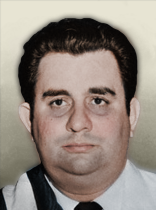
Role: Head of State
Party: Partido Liberal Nacionalistanote
Ideology: Civilian Dictatorshipnote
- President for Life: He rules his country more akin to a dictator, despite officially being a president.
Costa Rica

Official Name: Republic of Costa Rica
Ruling Party: Partido Liberación Nacionalnote
Ideology: Social Democracynote
José Figueres Ferrer

Role: Head of State
Party: Partido Liberación Nacionalnote
Ideology: Social Democracynote
- Gameplay and Story Segregation: Despite adhering to the democratic system, Figueres never steps down from power for the entire game due to a lack of implemented elections in Costa Rica.
Panama

Official Name: Republic of Panama
Ruling Party: Partido Liberal Nacionalnote
Ideology: Classical Liberalismnote
- Butt-Monkey: Even though hundreds of ships regularly pass through their canal and make millions of dollars, Panama only acquires a meager $250,000, even though they own the canal. Typically, Panama tends to make the least amount of profit from any international trade that crosses through them.
- Corrupt Politician: Panama's bureaucracy is full of these, in which any bill, public development, or acquisition can't even happen without a backroom deal or a private "donation" to the politicians. Any investigation into this problem is quickly suppressed, allowing the problem to persist.
- The Resenter: Panama resents the United States for controlling their canal and profiting off of it more than they do. The tension finally escalates when Panamanian rioters rise up against the Canal Zone Guards and engage in a tussle with them. The situation only gets worse when a student gets shot when trying to evacuate wounded protesters, becoming a martyr for future riots.
- Teeth-Clenched Teamwork: Behind the political scene, every government branch competes and fights each other to accumulate more power for themselves. They're only united together out of the interest of self-survival from foreign threats.
Roberto F. Chiari Remón

Role: Head of State
Party: Partido Liberal Nacionalnote
Ideology: Classical Liberalismnote
- We Hardly Knew Ye: Chiari's remaining presidential term lasts up to two more years before he steps down and Arias gets elected.
Arnulfo Arias
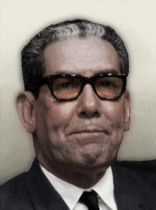
Role: Head of State (1964 election)
Party: Partido Panameñistanote
Ideology: National Conservatismnote
- Failure Is the Only Option: Inverted. Arias will always win the 1964 election and succeed Chiari.
The Caribbean
Republic of Cuba
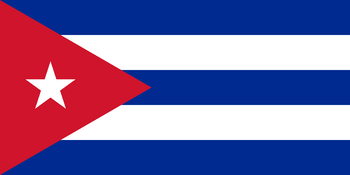
Official Name: Republic of Cuba
Ruling Party: Organización Revolucionaria Integradanote
Ideology: Provisional Governmentnote
- Allohistorical Allusion: The ORI is based on the actual coalition party that governed Cuba from 1961 to 1962, which became notorious for factionalism and infighting.
- Beneath Notice: Though Cuba is a major backer of the Caribbean Legion, they'll avoid most of the blame if the invasion fails because everyone will focus on demeaning the United States.
- Historical Relationship Overhaul: Since the Soviet Union is no longer their main rival in the Cold War, the United States is less hostile to communism in this timeline and thus had an icier relationship with Fulgencio Batista, Cuba's former dictator. Whatever diplomacy they had left went down the drain when Batista started getting chummy with Trujillo, an open fascist, increasingly favored Dominican investments, and ignored the warnings of the American ambassador, leading the United States to support Castro and M-26-7 in 1957. The pro-OFN socialist presidency of Gaitán in Colombia heavily influenced Castro, while Mexico openly supported the revolution from the start, leading to Castro keeping his former disinterest in communism. This explains why Castro's regime, infamous for opposing the United States in OTL, is an OFN ally in this timeline. If Castro becomes a socialist, he prefers a revolutionary form of democratic socialism instead of authoritarian Marxism-Leninism.
- Hope Bringer: The successful Cuban Revolution has enflamed other resistance groups in the Caribbean to overthrow the repressive dictatorships in their own country.
- Kangaroo Court: If the Caribbean Legion takes over the Dominican Republic, they will capture Cuba's former dictator, Fulgencio Batista, who has been living in exile. Taken back to his home island, a public show trial is held to humiliate Batista and have him executed on the spot for his past crimes.
- Regime Change: As a long enemy to Trujillo, Cuba pitches in to the Caribbean Legion's preparation for the Puerto Plata invasion, hoping that they will overthrow the Dominican dictator.
- We ARE Struggling Together: The ORI is an unstable coalition whose factions have little in common besides their shared goal of reforming Cuba and agreeing to put Castro in charge. Otherwise, the various factions of the ORI compete with each other that often leads to infighting and division. By game start, infighting has gotten so bad that Castro is the only man holding everything together.
Fidel Castro

Role: Head of State
Party: Organización Revolucionaria Integradanote , Partido del Pueblo Cubano - Ortodoxosnote (1962 election), Partido Vanguardia Unida de la Revolución Cubananote (Dictator)
Ideology: Provisional Governmentnote , Revolutionary Gaitanismonote (1962 election), Institutional Despotismnote (Dictator)
In-Game Biography Click to Show
In-Game Biography (Dictator) Click to Show
- Allohistorical Allusion:
- Cuba, along with Mexico and the OFN, can organize the Caribbean Legion, an international anti-fascist militia with the goal of overthrowing the Trujillo regime in the Dominican Republic. In real life, a young Castro was a member of the Legion, though its attempts at invading the DR were unsuccessful.
- After overthrowing Batista, Castro nationalized Cuba's industry and businesses, but now seizing Dominican, not American, assets and plantations.
- Castro can announce his dictatorship by continuing to suspend the 1940 Constitution and not calling elections, which is exactly what he did in real life.
- If he restores democracy, Castro rejoins his old party, the Orthodox Party, which he was a real-life member of in the 1950s and even tried to run for election. Historically, M-26-7 was founded by the Orthodox youth wing rather than the communists.
- If he becomes a dictator, Castro's new party is named similarly to the real-life Party of the Cuban Socialist Revolution, the predecessor to the Communist Party of Cuba.
- Cigar Chomper: He's usually found smoking one of his Cuban cigars when talking with friends.
- Face–Heel Turn: Castro starts as the face of the anti-Batista movement, having led the 26th of July Movement to overthrow the tyrant. Unfortunately, he can adopt a Hobbesian worldview and become Cuba's new dictator as he did in real life, contrary to José Martí's vision of a free and democratic Cuba.
- Internal Reformist: After his victory, Castro initiated a broad set of reforms, covering land, healthcare, welfare, and education. While the reforms are enormously popular, some worry that these changes to be too radical and quick, which may spell doom for Castro's government. Castro also hasn't fully dedicated himself to turning Cuba into a democracy yet, leaving it ambiguous if he'll follow José Martí's dream of a democratic Cuba, despite declaring himself Martí's heir. Yet, Castro is the only person holding the entire coalition together at this point. Regardless if he's democratic or not, Castro will continue to carry out his revolutionary policies.
- Irony: In real life, Castro was known for his proud and public opposition to the American government, and was the target of multiple CIA-sponsored anti-communist operations, including the famous Bay of Pigs Invasion. In TNO, Castro presently has a good relationship with the United States and is popular within the OFN, and it's his enemy Trujillo who's on the CIA's hitlist. This has some truth in it, as in real life, the CIA did send an agent to help advise M-26-7
 and funded Castro's activities after 1958. Should the US support the Caribbean Legion over Balaguer after Trujillo's fall, Cuba will even join the OFN.
and funded Castro's activities after 1958. Should the US support the Caribbean Legion over Balaguer after Trujillo's fall, Cuba will even join the OFN. - Rebel Leader: Just as in real life, Castro made international headlines leading two armed revolutions against Fulgencio Batista's dictatorship. His first attack on the Moncada Barracks failed, but he returned a second time, leading M-26-7 and becoming the face of the anti-Batista revolution. By 1962, he's one of the most iconic examples of this trope across Latin America, together with Guadalupe Salcedo in Colombia.
- Signature Headgear: Castro continues wearing his famous Ridgeway cap.
- The Revolution Will Not Be Vilified: If Castro holds elections, he becomes one of the lucky few to have broken the trend of revolutions resulting in new dictatorships. This even extends to his socialist ideology, which is meant to ensure that revolution always ends in a stable democracy.
- Universally Beloved Leader: Downplayed. Should he honor his promises and hold elections, Castro wins by Cuba's biggest landslide to date, and becomes one of the very rare genuine examples of a popular and charismatic leader being reelected again and again. But while the people love him, Castro only wins again and again because of his friendly relationship with the opposition made up of fellow revolutionaries and the resulting consensus he built with their parties. If that consensus fails to hold, he'll be voted out in 1966.
- Well-Intentioned Extremist: Furious at the paralyzing infighting of the ORI, Castro can drop his support for democracy, go the way he did historically and become a new dictator because he believes only an iron fist can improve Cuba and fulfill the wishes of his hero, José Martí.
José Antonio Echeverría

Role: Head of State (1966 election)
Party: Partido Socialcristiano de Cubanote
Ideology: Christian Progressivismnote
In-Game Biography Click to Show
- Affectionate Nickname: On the streets, Echeverría is affectionately nicknamed Manzanita or "Little Apple".
- Real Men Love Jesus: Echeverría is a devout Catholic who will emphasize the Church and Catholicism's role in the government, and even aim to turn the Church into a radical force for social change.
- Rebel Leader: He founded the Revolutionary Student Directorate with radical Catholic students, waging guerrilla warfare against the Batista regime together with Castro, and even attacking the Presidential Palace to try and kill Batista.
- Serendipitous Survival: In OTL, Echeverría was executed shortly after his assault on the Presidential palace in 1957 but in TNO, he managed to survive and escape thanks to the assistance of CIA and DFS agents.
Carlos Prío Socarrás

Role: Head of State (1966 election)
Party: Partido Revolucionario Cubano (Autentico)note
Ideology: Left-Wing Corporatismnote
In-Game Biography Click to Show
- The Exile: After being overthrown by Batista, Prío Socarrás fled Cuba as an exile, though his aid to M-26-7 allowed them to overthrow the dictator and permit him to return to the island.
- Last-Second Chance: Though his tale as President ended in disaster, Prío Socarrás may be given a second chance to redeem himself and implement the reforms he wanted to for decades. He must not waste this opportunity because, if he fails, he and everything he stands for will be a forgotten footnote in history.
- Rebel Leader: Although not part of the Revolution from the start, Prio handled M-26-7's funding and even led his own group of supporters into battle against Batista.
- Tragic Hero: His first presidency is a well-known tragedy throughout Cuba. In spite of his good intentions, Prío Socarrás's administration was marred with corruption and violence as in real life, which he proved unable to stop. Seen as too ineffectual, Prío Socarrás was eventually overthrown in a military coup by Batista, ending his once promising presidency.
Netherlands Antilles

Official Name: Netherlands Antilles
Ruling Party: Royalistennote
Ideology: Interim Governmentnote
- Government in Exile: The Dutch Antilles is the home of Queen Juliana of the Netherlands and the Dutch government-in-exile, following its relocation to the islands after Suriname achieves independence.
Juliana

Role: Head of State
Party: Royalistennote
Ideology: Interim Governmentnote
See her entry on the South America subpage.Isaac Arend Diepenhorst

Role: Head of State (Juliana succession)
Party: Christen-Democratisch Appèl/Partido Nashonal di Pueblonote
Ideology: Progressive Conservatismnote
- You Are in Command Now: Diepenhorst becomes the leader of the Netherlands Antilles following the independence of Suriname.
Haiti
Haiti

Flag of Duvalier's Haiti
Official Name: Republic of Haiti
Ruling Party: Parti Républicain Haïtiennote
Ideology: Oligarchynote
- The Alliance: Haiti is a member of the Organization of Free Nations, joining for protection from Trujillo’s Dominican Republic. The country is dependent on OFN forces to keep the peace within Haiti.
- Aristocrats Are Evil: The mulattocracy is an elite class of aristocrats who keep most of the country impoverished to enjoy their decadent lifestyles.
- Bilingual Bonus: The Republic of Haiti's flag has French text that translates to "Unity makes strength", which is their national motto.
- Les Collaborateurs: After the American invasion of Haiti in 1915, some chose to collaborate with their new occupiers, who would become the powerful mulatto elite when the United States left them to their own devices.
- Puppet State: Though the United States formally gave independence back to Haiti in 1934, their influence over the country is suffocating, continuing to meddle in their politics to ensure that they remain in their sphere of influence.
- Red Scare: If Trujillo is overthrown in the Puerto Plata invasion, the Haitian revolutionaries become widely seen as the new threat, especially as they begin attacking both Dominicans and their countrymen.
- Won the War, Lost the Peace: Haiti is plagued with guerrillas who oppose the pro-American oligarchy, in which it has become a serious drain on the OFN to keep the peace.
Pierre Déjole

Role: Head of State, Economy Minister (Déjole cabinet)
Party: Parti Républicain Haïtiennote
Ideology: Oligarchynote
In-Game Biography Click to Show
- Corrupt Politician: Déjoie has spent plenty of time enriching himself from the mulattocratic regime that rules Haiti.
- Dismotivation: Déjoie is an entrenched figure in the mulattocracy and fully intends on keeping things the very same way as his predecessor.
- Internal Reformist: Downplayed. Many had hoped that Déjole would reform the corrupt and exploitative mulattocracy, but besides some economic relief, only token political reforms have been implemented.
Louis Déjoie Jr.

Role: Head of State (Déjole retired)
Party: Parti Républicain Haïtiennote
Ideology: Oligarchynote
- Meet the New Boss: When Déjole peacefully retires, Déjoie Jr. is promoted in his place and set to continue the oppressive status quo.
Élie Lescot

Role: Head of Government (Déjole cabinet), Head of State (Déjole assassinated)
Party: Parti Républicain Haïtiennote
Ideology: Oligarchynote
In-Game Biography Click to Show
- Evil Mentor: Lescot acted as a mentor to Pierre Déjole, who tied himself to Lescot before succeeding him as president.
- Meet the New Boss: As namedropped in his biography, Lescot continues the muluttocracy of Déjoie, with any form of change or reform being unlikely to happen under his rule.
- You Are in Command Now: If Déjole is assassinated, Lescot will be quickly inaugarated as his successor.
Gerard Lescot

Role: Head of State (Lescot assassinated, Lescot retired, Cantave succession)
Party: Parti Républicain Haïtiennote
Ideology: Oligarchynote
François Duvalier

Role: Head of State (1964 election, Cantave succession)
Party: Parti de l'unité nationalenote
Ideology: Right-Wing Populismnote , Personalistic Dictatorshipnote (Constitutional referendum)
In-Game Biography Click to Show
- Cult of Personality: Duvalier will set about constructing a cult of personality surrounding himself as he begins to consolidate power around himself following his electoral victory.
- Life Will Kill You: If Duvalier successfully consolidates his power and avoids an invasion by his rivals, he will still die as a result of a second heart attack due to complications with diabetes.
- Red Baron: He is known as "Papa Doc."
- Red Scare: Communists are regularly oppressed in the Duvalier regime, which makes sense, given that they would be ideological enemies to his reactionary administration.
- Red and Black Totalitarianism: Should he take over Haiti and transform it into a personalistic dictatorship, he would change the color scheme of the country's flag from red and blue to red and black.
- Revenge Before Reason: If the Hinche negotiations do not go in his favour, Duvalier will invade the Dominican Republic to seize control of the territory, something that will likely result in his defeat at the hands of the better equipped Dominican forces.
- Secret Police: His MSVN paramilitary enforces Duvalier's totalitarian regime through disappearance, rape and public murder.
Jean-Claude Duvalier

Role: Head of State (François succession)
Party: Parti de l'unité nationalenote
Ideology: Personalistic Dictatorshipnote
- Adipose Rex: Not an exactly royal example, but Jean-Claude succeeds his father as dictator of Haiti, and is shown as considerably overweight in his portrait.
- Like Father, Like Son: Jean-Claude is the son of François and is just as dictatorial when he takes over after his father's passing.
- Meet the New Boss: After François dies in 1971, Jean-Claude will succeed him as leader of the country and continue the legacy of his father's regime.
- Red Baron: He is known as "Baby Doc."
Franck Lavaud

Role: Security Minister (Déjole cabinet), Head of State (Reform coup)
Party: Forces Armées d'Haïtinote , Parti Républicain Haïtiennote (Lavaud election)
Ideology: Interim Governmentnote , Dominant-Party Democracynote (Lavaud election), Controlled Democracynote
In-Game Biography Click to Show
- Cincinnatus: He holds the presidency for as much time as he needs to write and approve a new constitution before stepping down and letting the Haitians elect their leader.
- The Coup: In reaction to the Carribean Legion's failure to make a landing during the Puerto Plata invasion, Lavaud will launch a coup against Déjole to democratise Haiti and organize future elections.
- Internal Reformist: Subverted. Opposed to Déjole, Lavaud promises radical reforms and a new constitution that would guarantee equality and democracy for all. However as president if elected, despite making progress on anti-corruption measures and dismantling the mulattocracy, Lavaud and his party have no intention on actually democratising Haiti.
- Pyrrhic Victory: After a difficult process of rallying political parties and promising the reform the country, Lavaud discovers that being interim President isn't so easy. His agenda makes him hated by the mulattocracy, who don't want to surrender any of their power, while the United States pulls back their support of the new "anti-America" government. The weakness of the Lavaud administration leaves it incredibly vulnerable for Alexis and the Parti Populaire de Libération Nationale to take control of Haiti.
Daniel Fignolé

Role: Head of State (Lavaud, 1968, or 1972 election)
Party: Parti Républicain Haïtiennote , Mouvement Ouvrier des Paysansnote (Lavaud election)
Ideology: Transitioning Democracynote , Authoritarian Developmentalismnote (Election)
In-Game Biography Click to Show
- The Determinator: Fignolé acknowledges how hard it will be to fix all of Haiti's problems, but deems it necessary to tackle them, no matter the odds.
- Hero-Worshipper: His liberalism is inspired by the optimism and actions of Franklin D. Roosevelt, giving him the motivation to continue his difficult mission of reforming Haiti.
Max Hudicourt

Role: Head of State (Lavaud or 1968 election)
Party: Parti Républicain Haïtiennote , Parti Socialiste Populairenote (Lavaud election)
Ideology: Left-Wing Corporatismnote
In-Game Biography Click to Show
- Internal Reformist: Hudicourt is one of the most radical reformers in Haiti, dedicated to fixing the vast economic inequality plauging the country.
- Short-Lived Leadership: If the communists take over Haiti, Hudicourtccan be given leadership, but he won't stay for long before he retires and passes the position to Jumelle.
Franck Sylvain

Role: Head of State (1972 election)
Party: Mouvement Ouvrier des Paysansnote
Ideology: Market Liberalismnote
- Red Scare: Sylvain has had a history of spreading anti-Communist works, decades before the game's start.
Luckner Cambronne

Role: Head of State (1972 election)
Party: Parti Républicain Haïtiennote
Ideology: Right-Wing Populismnote
- Rags to Riches: Cambronne grew up when his father was a poor preacher before becoming a potential leader of Haiti.
Clement Jumelle

Role: Head of State (1972 election, Hudicourt retired)
Party: Pati Nasyonalnote
Ideology: Left-Wing Populismnote
- Historical Badass Upgrade: Jumelle has far better political prospects in this timeline. In OTL, he dropped out of the 1957 general election out of suspicion that the army was monitoring him; here, no such possibility can happen.
- Serendipitous Survival: Unlike OTL, Jumelle doesn't die from kidney failure in 59' due to not being on the run from the army and having access of better healthcare.
Léon Cantave

Role: Head of State (Anti-Communist coup)
Party: Forces Armées d'Haïtinote
Ideology: Military Juntanote , Personalistic Dictatorshipnote (Regime consolidated)
In-Game Biography Click to Show
- Evil Reactionary: Cantave cares very little for Haiti's democracy and will overthrow it for a dictatorship if the Dominican Republic is couped by communist guerrillas.
- Red Scare: If communists takeover the Dominican Republic, Cantave will coup the current government, with his focus being exterminating the communists he claims are rotting Haiti's structures from within.
- Teeth-Clenched Teamwork: While they feel wary about giving aid to his repressive regime, the OFN supports Cantave in order to put an end to the PPLN.
Paul Magloire

Role: Head of State (Cantave counter-coup)
Party: Mouvement Ouvrier des Paysansnote
Ideology: Authoritarian Developmentalismnote
In-Game Biography Click to Show
- The Coup: Magloire can depose Cantave right when he attempts to entrench his power through a constitutional referendum, bringing democracy back to Haiti.
Haitian Revolutionary Front

Flag of the Socialist Republic of Haiti
Official Name: Haitian Revolutionary Front, Provisional Revolutionary Government of Haiti, Socialist Republic of Haiti (Noirism entrenched), People's Republic of Haiti (Ambroise), Republic of Haiti (Hudicourt elected)
Ruling Party: Parti Populaire de Libération Nationalenote
Ideology: Partisan Movementnote
- La Résistance: Whether it is opposing the plutocratic democracy of the mulattocracy or the dictators that succeed them, the PPLN fight together for a socialist Haiti free from imperialism.
Jacques Stephen Alexis

Role: Head of State
Ruling Party: Parti Populaire de Libération Nationalenote
Ideology: Partisan Movementnote , Revolutionary Frontnote , Pan-Africanismnote (Noirism entrenched)
In-Game Biography Click to Show
- Chummy Commies: He leads the socialist opposition to the mulatto aristocracy that exploits the black majority population.
- Necessarily Evil: When in power, Alexis resorts to morally questionable actions to prepare Haiti for a potential American invasion, including forced prison labor and the creation of the Agence de Défense Populaire to keep potential dissidents in line.
- Reconcile the Bitter Foes: When the PPLN takes over Haiti and becomes increasingly divided over their ideology, Alexis is capable of mediating peace between the conflicting groups, though many start to wonder how long he can keep the act up before he starts angering someone.
- Taking Up the Mantle: Alexis takes on the legacy of Jacques Roumain and his Pan-Africanist ideology, fueling opposition to the Americans and Trujillo.
- Won the War, Lost the Peace:
- Once Alexis topples the mulattocracy, he's then left with the equally difficult task of keeping the PPLN together, as they begin clashing over whether socialism or Noirism should be their ideological doctrine.
- Additionally, Alexis will have to contend with the US-backed remnants of the old government and Duvalier's far-right nationalists that provide resistance against his new left-wing government.
Max Hudicourt

Role: Head of State (Post-war reorganization)
Party: Parti Populaire de Libération Nationalenote
Ideology: Interim Governmentnote , Left-Wing Corporatismnote (Special election)
See his entry in the Haiti folder.
Jean-Jacques Dessalines Ambroise

Role: Head of State (Post-war reorganization)
Party: Parti Populaire de Libération Nationalenote
Ideology: Amazonismnote , Guevarismnote (Molina-led Dominican Republic), Revolutionary Gaitanismonote (Bosch-led Dominican Republic),
- Wild Card: Downplayed. Ambroise is committed to the socialist cause, but he is ideologically flexible. He starts out as an Amazonist, but can turn Guevarist or Gaitanist, depending on certain leaders in the Dominican Republic.
Clement Jumelle

Role: Head of State (Hudicourt retired)
Ideology: Reformist Socialismnote
See his entry in the Haiti folder.
Dominican Republic
Dominican Republic

Flag of the Republic of Santo Domingo
Flag of the Inter-American Peace Force
Flag of the Dominican People's Republic
Official Name: Dominican Republic, Republic of Santo Domingo (Trujillo, Haiti annexed), Transitional Authority of the Organization of American States and the Organization of Free Nations within the Dominican Republic (OFN invasion), Dominican People's Republic (López)
Ruling Party: Partido Dominicanonote
Ideology: Fascist Populismnote
- Allohistorical Allusion: With the United States opposed to fascism instead of communism in this timeline, the Dominican Republic mirrors the position of Fidel Castro's Cuba in the OTL Cold War, being an American-hostile island nation that serves as an outpost to the opposing ideology in the United States' own "backyard". Similarly to how Cuba also backed American opponents in several proxy wars, the Dominican Republic does the same, such as supporting Gómez's regime and the fascist New Granada against the OFN-backed Revolutionary Union in Colombia. For double irony, Castro is an American ally in this timeline, effectively borrowing Trujillo's friendlier relationship with the United States in OTL.
- Banana Republic: The Dominican Republic is a violent, fascist dictatorship run by Trujillo, who has been running a "whitening" campaign and waging genocide against the Haitians he's recently absorbed into his country.
- Cincinnatus: If defeated by the OFN after an attempted invasion of Haiti by either Trujillo or López, an OFN transitional authority will be temporarily set up in the Dominican Republic before holding elections and handing power over to Bosch or Bonnelly.
- Crapsaccharine World: Under Trujillo, the living conditions in the Dominican Republic appear to have vastly improved over the decades and its citizens are happy to remain under his rule, even if Trujillo is a cruel dictator who murders anyone that dares criticize or oppose him.
- Didn't Think This Through: The program of Blanqueamiento doesn't always persuade Iberians to move to the Dominican Republic because many are often comfortable living in Europe and have no interest in moving to a small island in the middle of the Caribbean.
- Egopolis:
- Santo Domingo, the Dominican Republic's capital, was renamed to 'Ciudad Trujillo' in 1936. The city will revert back to 'Santo Domingo' if any anti-Trujillo factions assume power.
- The land taken from Haiti in the 1950s was renamed to "Generalísimo Trujillo."
- The Exile: Fulgencio Batista, Cuba's old dictator, is living in the Dominican Republic as a hated exile in his native country. In the Puerto Plata invasion, the Caribbean Legion has a limited time window to catch him and bring him back to Cuba so that he can be executed.
- Final Solution: Under Trujillo, the Dominican Republic is actively committing genocide against Haitians in the land under Dominican occupation. This can extend to all of Haiti if a Trujillo-led Dominican Republic conquers Haiti, enabling a widespread campaign of genocide, destruction and renaming as a plan to destroy the Haitian national identity. The surviving Haitians will immigrate to neighboring countries in an effort to flee from the violence.
- Hated by All: As in real life, the Trujillo regime is undisputedly the cruelest and most violent regime in all of Latin America, and is actively despised by most of its neighbors, especially Haiti, Cuba, and the United States. They've only survived thanks to Iberian and Italian support from across the Atlantic. When the Triumvirate collapses, the Dominican Republic is left vulnerable, which happens in the Puerto Plata invasion.
- Please Select New City Name: The town of Hinche was renamed to its Spanish name of 'Hincha' when it was taken over by the Dominican Republic in the 1950s. Other cities will also be renamed if the Dominican Republic conquers and annexes Haiti, specifically naming Puerto Ramfis (Port-au-Prince), Gonaibo (Gonaïves), Cabo Quisqueya (Cap-Haïtien), and Yaquimel (Jacmel).
- Proxy War: The Dominican Republic is a proxy of the Iberian Union during the Puerto Plata invasion, as they are their closest ally in Latin America.
- La Résistance: The PRD is the primary opposition force to Trujillo and his regimes, though most of their leaders have been jailed and their forces scattered.
Rafael Trujillo

Military outfit
Puerto Plata victory
Role: Head of State
Party: Partido Dominicanonote
Ideology: Fascist Populismnote
In-Game Biography Click to Show
- Allohistorical Allusion: Like Fidel Castro in real life, Trujillo is the victim of several attempts to assassinate him by the CIA that always fails.
- Dark Horse Victory: When the Caribbean Legion invades to overthrow him, most observers predicted that his regime would collapse in a matter of weeks. However, there remains a chance for Trujillo to hold onto his power, slaughtering most of the Legion and capturing enough prisoners to hold hostage against the United States and Cuba, the main backers of the invasion.
- Even Evil Has Loved Ones: One of the most unambiguously evil men in Latin America, his only consistently humanizing quality is loving his son, whose career in the military was greatly boosted by his intervention in blatant nepotism.
- The Generalissimo: Arguably the inspiration for this trope in real life, Trujillo has all the trademarks; the tropical island, the corrupt military rule, the constant human rights violations, the megalomania, and the Egopolis named after himself.
- A God Am I: Many of his propaganda portraits features the phrase "Dios y Trujillo" in an effort to frame himself as a god on Earth. Most of his fanatical supporters believe this too.
- Politically Incorrect Villain: Trujillo supports Spanish immigration to the Dominican Republic in order to practice a whitening policy.
- Villain with Good Publicity: Despite his totalitarianism, many Dominicans praise Trujillo, believing that his tyrannical, but stable rule far outweighs the poverty and chaos they endured in the 1920's.
- Villainous Legacy: The legacy of his Haitian invasion will always dampen Dominican-Haitian relations for as long as its occupation lasts, even in the most optimal scenario where Trujillo is overthrown and Lavaud comes to power in Haiti.
- We Used to Be Friends: Trujillo used to be friends with Élie Lescot Sr., the old dictator of Haiti, giving a glimmer of hope that their countries could've co-existed peacefully. Unfortunately, it didn't last and border skirmishes between the two eventually escalated into a full-on Dominican invasion that still occupies Haitian land in the 1960's.
Tropes pertaining to upcoming content
- Fascist, but Inefficient: As revealed in the Puerto Plata expansion teaser, numerous priests expressed sympathy or aid to the anti-Trujillo opposition, which resulted in crackdowns, intimidation, and propaganda against them. However, this suppression united much of the church behind those priests opposed to Trujillo, culminating in a pastoral letter calling for freedom of speech and press, and an end to the crackdowns.
Rafael 'Ramfis' Trujillo

Role: Head of State (Trujillo succession or assassination)
Party: Partido Dominicanonote
Ideology: Fascism
In-Game Biography Click to Show
In-Game Biography (Puppet) Click to Show
- Idle Rich: His days as a puppet are spent living as a playboy and leaving almost all the work to Abbes García.
- Inadequate Inheritor: Compared to his feared and ruthless father, Ramfis is an embarrassment to the Trujillo name, spending more time racing and having affairs than making a name for himself in the political arena. Optics weren't improved either when he had a scandalous divorce with his first wife. If he ascends to his father's throne, most will snicker at his predicted incompetence, something that Ramfis is aware of and seeks to prove wrong.
- Nepotism: Despite his youth, Ramfis was showered with military promotions and awards he didn't deserve, simply because he was Trujillo's son.
- One-Steve Limit: He and his father share the same name, so he's nicknamed "Ramfis" to differentiate the two.
- Overlord Jr.: Ramfis is a fascist like his father, destined to succeed him when he either passes in 1968 or gets assassinated after the Puerto Plata invasion.
- Puppet King: In the power struggle to succeed Trujillo, Ramfis accepts a deal by the Military Intelligence Service to become their puppet so long as he's provided luxury cars and movie actresses to his heart's content. All real power will be concentrated to Johnny Abbes García, Trujillo's hypercompetent spymaster.
- Skewed Priorities: He's destined to succeed his father and continue the Trujillo regime, even though he's more interested in auto racing and banging movie actresses than ruling.
Johnny Abbes García

Role: Head of the Servicio de Inteligencia Militarnote
Ideology: Esoteric Despotismnote
- Dragon-in-Chief: If Ramis takes power, Abbes can offer him a deal to have whatever his heart desires in return for Abbes being the real power behind his reign.
- The Man Behind the Man: While Ramfis appears to be the face of his regime in his puppet path, in reality, it is Abbes, his agents and the German handlers behind them all.
- Nepotism: Abbes is rumored to be another product of nepotism like Ramfis and to have traded affairs as a young man with the former President to advance his career.
- Secret Police: Abbes is head of the Dominican Military Intelligence Service, which is the the main secret police force and death squad behind the Trujillo regime.
- Undying Loyalty: While he is ambitious, Abbes wants nothing more than to advance the will of the late Rafael Trujillo.
Joaquín Balaguer

Role: Head of Government (Trujillo cabinet), Head of State (Trujillo assassination or 1968 power struggle victory)
Party: Partido Dominicanonote
Ideology: Civilian Dictatorshipnote , Paternalistic Conservatismnote (Ceasefire), Controlled Democracynote (Rigged election), Transitioning Democracynote (Power struggle won)
In-Game Biography Click to Show
In-Game Biography (Caribbean Legion ceasefire) Click to Show
- Bullying a Dragon: If the ceasefire negotiations are rejected by Iberia, Balaguer will pull out of the talks too, sending a defiant letter to Nixon, denouncing his aid for the "opportunistic communists" in the Caribbean Legion.
- Cincinnatus:
- After Trujillo's assassination and the Puerto Plata invasion's ceasefire, Balaguer may organize elections, with Bosch and Bonnelly in the running.
- If he waits for Trujillo to pass away, Balaguer will ally with dissidents and anti-governmental opposition factions so he can win the power struggle for his throne. He promises to them that he will restore democracy if he wins, but it's very uncertain if he will keep his word.
- The Coup: Balaguer may organize an assassination of Trujillo so that he can take over and organize a ceasefire with the Caribbean Legion.
- Dragon with an Agenda: Balaguer is Trujillo's right-hand man, but when he sees his boss as a liability, he plots to undo his legacy, either waiting for him to croak or ordering his assassination.
- Know When to Fold 'Em: If the Caribbean Legion is not quelled in time, Balaguer will lose hope of Trujillo winning the Puerto Plata invasion and assassinate him, organizing a ceasefire and surrendering to the United States by offering to set up a pro-OFN regime.
- A Lighter Shade of Black: He's ruthless against people he suspects as communist sympathizers, but his regime is relatively safe and moderate compared to the one run by Trujillo.
- President for Life: If the Puerto Plata invasion ends in a ceasefire, Balaguer may set up rigged elections to guarantee his win, establishing another dictatorship in the Dominican Republic.
- Rags to Riches: Balaguer grew up in the slums of Santiago de los Caballeros before rising to become one of Trujillo's most trusted ministers and potential successor.
- Red Scare: Despite having many supporters who are grateful for ending Trujillo's tyranny, Balaguer can only focus on the "crypto-communists" who infiltrate Dominican society and he will do everything in his power to stop them from destroying the nation.
- Voluntary Vassal: After assassinating Trujillo, Balaguer approaches the United States and offers to join their sphere, if they call off the Caribbean Legion and support his regime. If the United States agrees, they will need to stabilize his new administration, lest it fall to a socialist revolution by López.
- We Used to Be Friends: He used to be content with lying low and letting Trujillo run his cruel regime, until he begins seeing his incompetence as a liability. From that point on, Balaguer can either orchestrate his assassination or wait for him to pass so that he can take over and undo his legacy.
Donald Reid Cabral

Role: Head of State (1966 power struggle victory)
Party: Government for the Rescue of the Republic
Ideology: Oligarchynote
- Not-So-Well-Intentioned Extremist: Outwardly, Reid proclaims that the oligarchical system he oversees is for the benefit of the Republic, allowing aristocratic families to maintain a balance of power and prevent one from becoming too powerful. In truth, it's just an excuse for them to stay in power and keep abusing their power.
- Pragmatic Villainy: Reid and his Triumvirate oppose Trujillo's unrestrained authority because his brash actions nearly brought the Dominican Republic to ruin and destroyed the hierarchy they've long benefited from. Following his assassination, they fight a power struggle with Ramfis and his loyalists to ensure that another dictator won't rise again and all power is concentrated to an oligarchy.
Elías Wessin y Wessin

Role: Head of State (Military coup)
Party: Emergency Junta
Ideology: Military Juntanote
- Military Coup: If neither Rafis or Reid can adequately seize power, Wessin will intervene by military coup and lead an emergency junta.
- Voluntary Vassal: Wessin appeals to the United States for its intervention, turning the Dominican Republic into their puppet so that their soldiers can hunt down any Trujillo loyalists and root out the last vestiges of fascism on the island.
Héctor García Godoy

Role: Head of State (Junta election)
Party: Partido Cristiano de Conciliación Nacionalnote
Ideology: Christian Democracynote
- Failure Is the Only Option: Inverted. If the junta is kept by the United States, García Godoy is guaranteed to be elected.
Antonio Guzmán

Role: Head of State (Post-junta or 1970 election)
Party: Partido Revolucionario Dominicanonote
Ideology: Provisional Governmentnote , Democratic Socialismnote (1970 election)
- Short-Lived Leadership: If immediate elections are held after Wessin's junta, Guzmán will be elected and sit in office for 50 days before being replaced by Bosch.
- Taking Up the Mantle: Bosch doesn't run for the 1970 election, so the PRD nominates Guzmán to take his place and continue his work.
Juan Bosch

Role: Head of State (Guzmán succession, post-Trujillo/OFN invasion or 1966 elections, Tavárez succession)
Party: Partido Revolucionario Dominicanonote
Ideology: Gaitanismonote , Revolutionary Gaitanismonote (Tavárez succession)
- The Exile: As a long-standing enemy to Trujillo, Bosch was forced to flee the Dominican Republic, only allowed to return when the dictator is deposed.
- The Future Will Be Better: Bosch's election and creation of a new constitution creates the Fourth Dominican Republic, permanently ending Trujillo's era and promising a better future of democracy and stability.
- Taking Up the Mantle: Bosch is Tavárez's designated successor to continue the People's Revolution.
- Teeth-Clenched Teamwork: His administration is a loose coalition of anti-Trujillo, left-wing groups who disagree with their leader multiple times. They only work together due to having a common enemy and little else beyond that.
Rafael Bonnelly

Role: Head of State (Post-Trujillo/OFN invasion, 1966, or 1970 election)
Party: Partido Dominicano (Facción Liberal)note , Partido Reformista Dominicanonote
Ideology: National Liberalismnote
- Heel–Face Turn: Bonnelly is a longtime member of Trujillo's regime and continues several of his policies, but he also ends his predecessor's harsh policies and prepares the Dominican Republic for democratization.
- Token Good Teammate: Despite working for Trujillo, Bonnelly has urged for a liberalization of the regime and finally gets to fulfill his wishes if he gets elected.
Máximo Antonio López

Role: Head of State (Communist putsch)
Party: Movimiento Popular Dominicanonote
Ideology: Guevarismnote , Amazonismnote (Dominican Cultural Revolution)
- Allohistorical Allusion: Following the Haitian War, López's reign descends into parallel of the OTL Cultural Revolution in China, even forming his own Red Guards to crack down on dissidents and the event being dubbed the Dominican Cultural Revolution in-universe.
- Defector from Decadence: After the Caribbean Legion's victory over Trujillo, López may defect from the interim government they form and start a second revolution against it, with the support of Bayo.
- Dirty Communists: In his quest to clamp down on Trujillo's legacy, López organizes Dominican Red Guards to begin conducting violent purges and crackdowns in the country.
- Full-Circle Revolution: His attempts to eradicate fascism and liberalism in the Dominican Republic merely recreates another dictatorship after Trujillo's downfall.
- Jumping Off the Slippery Slope: López starts off with an understandable goal of eradicating Trujillo's legacy and supporting insurgents who oppose American imperialism. Unfortunately, he ends up crossing the line after the Haitian War, where he initiates a violent period of crackdowns on anyone he suspects as being opposed to his vision.
Manuel Aurelio Tavárez

Role: Head of State (Anti-radical coup)
Party: Movimiento Popular Dominicanonote
Ideology: Revolutionary Gaitanismonote
- The Coup: After the Haitian War, Tavárez launches an anti-radical coup to depose López and set the Dominican Republic on the path away from Trujillo's legacy without resorting to needless violence.
- Hero-Worshipper: Tavárez idealizes the Cuban revolutionaries who overthrew Batista and uses them as a model for a Dominican People's Revolution.
Caribbean Legion

Flag of the Dominican Revolutionary Front
Official Name: The Second Caribbean Legion, United Dominican Front for the Eradication of Fascism (Dominican Civil War)
Ruling Party: Legionnaire Council
Ideology: Social Nationalismnote
- Allohistorical Allusion: The Puerto Plata invasion by the Caribbean Legion bears resemblance to a failed Cuban invasion of the Dominican Republic in 1959. It also resembles the Bay of Pigs invasion, as Dominican exiles and other anti-Trujillo groups are trained and funded by the CIA to overthrow an unfriendly government in the Caribbean.
- Fire-Forged Friends: The members of the Caribbean Legion are anti-fascist volunteers from across Latin America who have fought together in the name of destroying tyranny and forged a deep brotherhood from it, despite their cultural and linguistic differences. However, ideological differences can divide those bonds quickly.
- Plan B Resolution: If they are defeated by Trujillo's forces in the Puerto Plata invasion, the surviving Legion will flee to Haiti and try to start another revolution there, salvaging something from their doomed crusade and potentially fueling Alexis' rise to power.
- Private Military Contractors: Subverted. Their command structure is similar to a band of mercenaries, but they fight for ideological reasons rather than wealth.
- Proxy War: The Caribbean Legion is backed by the United States, Cuba, Costa Rica and Mexico to overthrow Trujillo.
- The Purge: If López's revolution fails, the Legion will conduct a massive bloodless purge to crack down on communist sympathizers. Befittingly, almost all the Cuban generals of the Legion were notable anti-communists of the Cuban Revolution in real life, who would fight alongside Castro and then turn against him when he became a communist.
- Teeth-Clenched Teamwork: The left-wing Caribbean Legion is still ideologically diverse, with particular animosity towards the communist members of the army. After Trujillo is overthrown, these tensions finally blow out into an attempted revolution by López.
- Won the War, Lost the Peace: After overthrowing Trujillo in the Puerto Plata Invasion, the Caribbean Legion forms a provisional government to pacify the country and prepare future elections. However, Trujillo remains a popular figure among many conservatives who will be opposed to the new revolutionary state, making the Dominican Republic's future questionable.
Alberto Bayo

Role: Head of State
Party: Legionnaire Council
Ideology: Social Nationalismnote
In-Game Biography Click to Show
- Cincinnatus: If the Puerto Plata invasion is successful, Bayo will serve as interim leader of the junta, until free elections can be organized.
- A Father to His Men: Bayo deeply cares for the men under his command and willing to join them in linked arms during their victory parade.
- Old Soldier: A Republican veteran of the Spanish Civil War, Bayo gave Fidel and his revolutionaries the military training that allowed them to survive in the Sierra Maestra, and now leads another band of brave youngsters into battle against a Caribbean tyrant.
Horacio Ornes

Role: Head of State (Ceasefire)
Party: Frente Unido Dominicano para la Erradicación del Fascismonote
Ideology: Social Nationalismnote
In-Game Biography Click to Show
- The Determinator: Ornes' lifelong goal has been fighting for the removal of caudillismo and fascism from the Dominican Republic, having previously fought in the first Caribbean Legion in 1947.
West Indies Federation
West Indies Federation
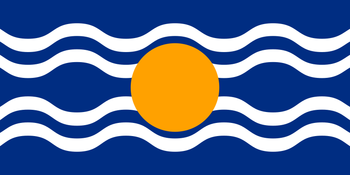
Official Name: West Indies Federation, West Indies Commonwealth (Federated), Caribbean Union (Unitarian)
Ruling Party: West Indies Federal Labour Party
Ideology: Liberalism
Formed from former British and French colonies in the Caribbean, the West Indies Federation is a member of the OFN and a close American ally. The future of the Federation is uncertain, and it’s doubtful if the country can survive the decade.- The Alliance: The West Indies Federation is a member of the American-led Organization of Free Nations.
- Balkanize Me: If Jamaica and Trinidad secede, the Federation might completely collapse into numerous island nations that are still largely aligned with the United States.
- The Federation: As the name implies, the West Indies Federation is a collective of Caribbean islands united together as a single political entity allied to the United States.
- Puppet State: With the two main islands of Jamaica and Trinidad gone, the West Indies Federation can choose to submit themselves as a puppet state of America to prevent its collapse.
- Reassigned to Antarctica: For American statesmen, the West Indies Federation is one of the worst places to be assigned to, as they are stuck with the inglorious duty of managing the confusing quagmire of West Indies politics.
- We ARE Struggling Together:
- As an artificially constructed political federation in the wake of the UK's collapse, the members of the West Indies Federation don't really have any reason to remain united or cooperate with one another.
- The Federation has to balance the interests of the two biggest islands, Jamaica and Trinidad, and the remaining "Little Eleven."
Grantley Herbert Adams

Role: Head of State
Party: West Indies Federal Labour Party
Ideology: Liberalism
In-Game Biography Click to Show
In-Game Biography (Independent Little Eleven): Click to Show
In-Game Biography (American Puppet): Click to Show
- Growing A Spine: Adams can refuse America’s offer to become a puppet state, surprising those in Washington, his own party, and even his most prominent detractors.
- Know When to Fold 'Em: When the United States invaded Barbados, Adams was incensed, but cowed to the Americans anyway, seeing that resistance would be futile against a nuclear superpower right at their doorstep.
- The Quisling: To his critics, Adams is an power hungry president who sold out his own country to American interests.
- Status Quo Is God: Adams seeks to preserve the status quo of the Federation and sees the growing leftist movements as unruly radicals threatening to reverse the economic freedoms he has worked to guarantee while they, in turn, lambast him as merely the US and OFN's colonial governor of the islands.
- Voluntary Vassal: Adams can choose to submit the Federation as a puppet state of America to prevent its collapse after Jamaica and Trinidad secede from it, ultimately proving his critics correct.
Norman Manley

Role: Head of State (Jamaica stays)
Party: West Indies Federal Labour Party
Ideology: Liberalism
In-Game Biography Click to Show
- Clashing Cousins: Manley and Bustamante are cousins and co-founded the People’s National Party and worked together side by side. However, Bustamante soon split from the PNP, founding the Jamaican Labour party. Manley’s support for Jamaica remaining in the West Indie’s Federation has turned the two into public rivals, even if they are cordial in private.
- Les Collaborateurs: Manley is a native Jamaican who is fervently loyal to the United States and he will strengthen the Federation's ties to them, should Jamaica's independence referendum fail.
- Gambit Roulette: Manley’s plan for reforming the West Indies largely depends on the Jamaican independence referendum failing, which can easily be foiled by foreign meddling from Japan and Germany.
- Internal Reformist: Manley recognizes that the Federation is dysfunctional in its current state and will draft a new constitution to reform it into the West Indies Commonwealth. The Manley constitution sets limits for what each member state can and cannot do and includes protections for the cultures of the islands. If he is successful, all unrest in the commonwealth effectively ends, with calls for independence in the individual islands becoming increasingly rare.
- Reasonable Authority Figure: He’s willing to resign and let Jamaica secede to stop the violence gripping the country.
- Worthy Opponent: Despite being public rivals, Manley and Bustamante are quite friendly in private and have mutual respect for each other.
Eric Williams

Role: Head of State (Caribbean Union formed)
Party: West Indies Federal Labour Party
Ideology: National Liberalismnote
See his entry in the Trinidad and Tobago folder. Jamaica
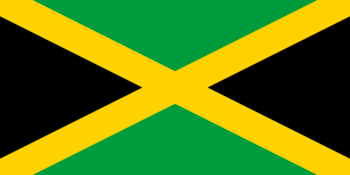
Official Name: Jamaica
Ruling Party: Jamaican Labor Party
Ideology: Populist Conservatismnote
- The Coup: Downplayed. If the protests in Jamaica get too violent, Prime Minister Manley will be forced to resign to quell the storm, allowing Bustamante to take the position of Jamaica's Prime Minister and secede from the Federation in what’s described as a "bloodless coup".
- Unwitting Pawn: In their pursuit for independence from the West Indies Federation, they have inadvertently opened an opportunity for Germany and Japan to meddle in foreign affairs and subvert American dominance in the Caribbean by fracturing the American-aligned West Indies Federation.
- Video Game Cruelty Punishment: If America denies Jamaica an independence referendum, it will only radicalize the Jamaican independence advocates, leading them to seek more violent means of gaining independence. It will be harder for Jamaica to remain in the Federation, and if Jamaica achieves independence after this, they will leave the OFN.
Alexander Bustamante
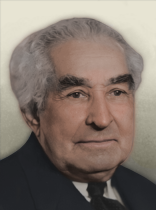
Role: Head of State
Party: Jamaican Labor Party
Ideology: Populist Conservatismnote (actual), Social Nationalismnote (puppet)
In-Game Biography Click to Show
In-Game Biography (Coup) Click to Show
- Clashing Cousins: Bustamante frequently publicly clashes with his cousin Norman Manley, who wants Jamaica to remain in the Federation as an OFN ally.
- The Determinator: His enemies will not deny Bustamante's tenacity in advocating Jamaican independence and he's only becoming more aggressive in his demands for a referendum to resolve the issue.
- Occupiers Out of Our Country: From Bustamante's perspective, the West Indies Federation is just an occupying force over Jamaica and he wants to break free from them so that Jamaicans alone can determine their own "destiny".
Trinidad and Tobago
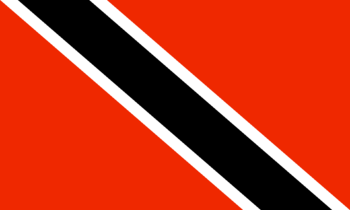
Flag of Trinidad, Tobago, and Grenada
Black Power Revolution
Official Name: Trinidad and Tobago, Trinidad, Tobago, and Grenada (Federation Collapse)
Ruling Party: People's National Movement
Ideology: National Liberalismnote
- Allohistorical Allusion: The Black Power Revolution
 that happened in our timeline can potentially still happen to Trinidad and Tobago in this timeline, although this one can be far more successful than OTL.
that happened in our timeline can potentially still happen to Trinidad and Tobago in this timeline, although this one can be far more successful than OTL. - Crouching Moron, Hidden Badass: Trinidad is a tiny island nation that would seem chaotic after its hasty exit from the Federation, but they actually manage to ride out the storm because of their access to oil, a valuable resource that Trinidad has greatly profited from selling.
- Let No Crisis Go to Waste: Trinidad can use the chaos of the Federation’s collapse to annex the island of Grenada.
- Pyrrhic Victory: After Trinidad gains independence, the tiny island nation can end up engulfed in mass protests against the socio-economic equality against the country's Black population, spelling chaos and trouble.
- Screw This, I'm Outta Here: If the West Indies Federation fails to stop Jamaica from declaring independence or accept Williams' proposal to centralize the Federation, Trinidad and Tobago will secede from the country as well to maintain its own economic stability, signaling the incoming collapse of the Federation.
Eric Williams

Role: Head of State
Party: People's National Movement, West Indies Federal Labour Party (West Indies Federation)
Ideology: National Liberalismnote
In-Game Biography Click to show
In-Game Biography (West Indies Federation)Click to Show
- Defector from Decadence: Should the West Indies Federation reject his proposal to centralize the government, Williams will declare Trinidad and Tobago's independence to pursue their own agenda, even if Williams is still willing to work with the OFN.
- Internal Reformist: If Jamaica wins its independence, Williams will push for radical reforms to centralize the Federation as a unitary state with a singular constitution, believing that it would be better suited to reform the myriad of problems facing the country.
- Universally Beloved Leader: Williams is beloved across the Caribbean and, if he secedes from the Federation, his election will be near universal. However, Williams can end up losing this status if he fails to address the social ills plaguing his country, leading to mass mutinies coordinated by the Black Power movement that culminates into Williams' resignation.
Makandal Daaga
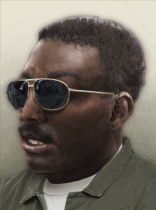
Role: Head of State (Coup)
Party: National Joint Action Committee
Ideology: Left-Wing Nationalismnote
In-Game Biography Click to Show
- Cincinnatus: After the Black Power Revolution succeeds, Daaga will act as interim president until the loose coalition of laborers, activists, and nationalists can form a stable government.
- The Coup: Shortly after Trinidad's independence, Daaga can launch a coup against Williams, seizing power through a "Black Power Revolution" and swearing to create a better future for the Afro and Indo people.
- Occupiers Out of Our Country: Daaga decries American imperialism in Latin America and intends to withdraw the country away from their sphere of influence.
- We ARE Struggling Together: Once taking power, the Black Power movement becomes divided over what to do afterwards. The unions want greater protections and benefits for the common workers, the military leads want an apolitical government in their hands, and the Black Power movement itself demands social changes in line with their original goals of greater socio-economic equality. With himself at the helm, it will be up to Daaga to navigate this chaos and carve a stable future for Trinidad.
St. Kitts, Nevis, and Anguilla

Official Name: Saint Kitts, Nevis, and Anguilla
Ruling Party: People's Action Movement
Ideology: Conservatism
Frederick Albert Phillips
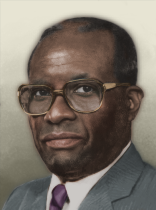
Role: Head of State
Party: People's Action Movement
Ideology: Conservatism
- Richard Nixon, the Used Car Salesman: In OTL, Phillips is best known as the first black governor in the British colony, Saint Christopher-Nevis-Anguilla. He didn't have any association with the People's Action Movement like he does in this timeline.
Antigua and Barbuda

Official Name: Antigua and Barbuda
Ruling Party: Progressive Labour Movement
Ideology: Progressivism
George Walter
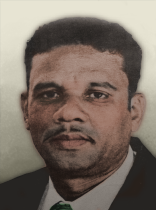
Role: Head of State
Party: Progressive Labour Movement
Ideology: Progressivism
- Allohistorical Allusion: George Walter is in support of Antigua and Barbuda's independence, but now seeking independence from the West Indies Federation instead of Britain.
Guadeloupe

Official Name: Guadeloupe
Ruling Party: Parti Communiste de Guadeloupenote
Ideology: Left-Wing Nationalismnote
Marcel Gargar
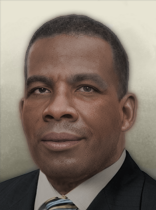
Role: Head of State
Party: Parti Communiste de Guadeloupenote
Ideology: Left-Wing Nationalismnote
- Richard Nixon, the Used Car Salesman: Gargar was a Guadeloupean politician who was elected to the French Senate in OTL, a more modest position than becoming its potential head of state following the West Indies Federation's collapse.
Dominica
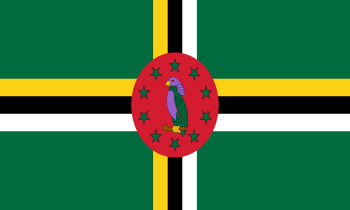
Official Name: Dominica
Ruling Party: Dominica Labour Party
Ideology: Controlled Democracynote
Patrick Roland John

Role: Head of State
Party: Dominica Labour Party
Ideology: Controlled Democracynote
- President for Life: Though formally president, John rules Dominica under a controlled democracy so that he can't be truly challenged politically.
Martinique
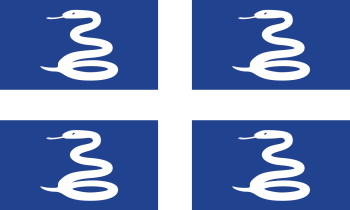
Official Name: Martinique
Ruling Party: Parti Socialistenote
Ideology: Progressivism
George Marrie Anne

Role: Head of State
Party: Parti Socialistenote
Ideology: Progressivism
- Richard Nixon, the Used Car Salesman: In OTL, Anne was elected to the French Senate as a representative of Martinique without ever having the chance to rule the island independently like in this timeline.
St. Lucia

Official Name: Saint Lucia
Ruling Party: United Workers Party
Ideology: Christian Conservatismnote
John Compton
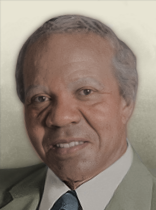
Role: Head of State
Party: United Workers Party
Ideology: Christian Conservatismnote
- Allohistorical Allusion: Compton did play a role in St. Lucia's independence in OTL, albeit by negotiating with Britain instead of wish the West Indies Federation.
St. Vincent and the Grenadines

Official Name: Saint Vincent and the Grenadines
Ruling Party: People's Political Party
Ideology: Democratic Socialismnote
- Bilingual Bonus: The flag of St. Vincent and the Grenadines has "Peace and Justice" inscribed in Latin, adding to the general Roman influence of its design.
Ebenezer Joshua

Role: Head of State
Party: People's Political Party
Ideology: Democratic Socialismnote
- Historical In-Joke: In OTL, Joshua voiced his support for the short-lived and doomed West Indies Federation. Here, he can only appear after its dissolution.
Barbados
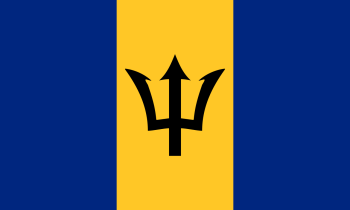
Official Name: Barbados
Ruling Party: Democratic Labour Party
Ideology: Left-Wing Populismnote
Errol Barrow
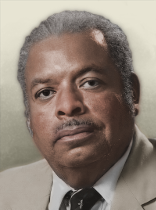
Role: Head of State
Party: Democratic Labour Party
Ideology: Left-Wing Populismnote
- Allohistorical Allusion: Barrow is well-known in OTL Barbados for negotiating the country's independence from Britain and even becoming its first Prime Minister. He ends up leading an independent Barbados again in this timeline, but now after negotiating with the West Indies Federation instead of Britain.
Grenada
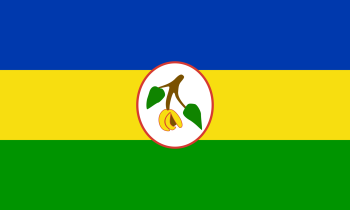
Official Name: Grenada
Ruling Party: Grenada National Party
Ideology: Liberal Conservatism
Herbert Blaize

Role: Head of State
Party: Grenada National Party
Ideology: Liberal Conservatism
- Richard Nixon, the Used Car Salesman: In the OTL 1960's, Grenada hadn't yet won its independence, so Blaize served as Chief Minister and Premier of Grenada under Elizabeth II. In this timeline, Grenada can gain its independence much sooner, with Blaize becoming head of state two decades earlier than he did in real-life.



